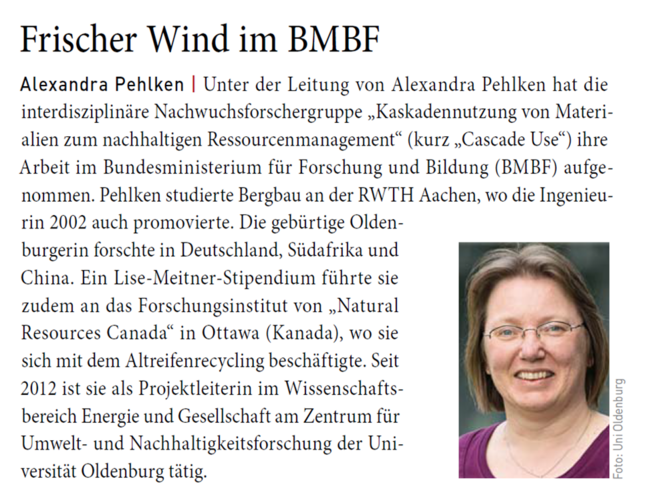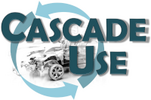Press
Press
Cascade Use has made it into the news of the Canadian autorecyclers
The automotive recyclers of Canada made a report about remanufacturing and reuse of vehicles in a changing automotive world. You can find the article here.
Recycling Magazin Issue 09/2014
 Link to magazine: Recycling magazin Ausgabe 09/14 (german)
Link to magazine: Recycling magazin Ausgabe 09/14 (german)
Report from french embassy
Optimiser l’utilisation des matières premières
L’Université Carl von Ossietzky d’Oldenbourg (Basse-Saxe) a récemment lancé un nouveau groupe de recherche, baptisé « Cascade Use » [1], et dont les travaux portent sur l’amélioration de l’usage des matières premières. Mené essentiellement par de jeunes scientifiques, ce projet de recherche vise à trouver des moyens pour augmenter la durée de vie et l’utilisation des matières premières. Ceci passe notamment par l’intégration de cette problématique dans les différents cycles de vie des produits.
Les chercheurs d’Oldenbourg ont pour cela développé un outil qui évalue les différentes possibilités d’utilisation optimale des ressources naturelles, tout en minimisant l’impact sur l’environnement. Leur approche combine des données économiques et techniques (durée de vie des matériaux) à des considérations environnementales (empreinte carbone et coût des procédures de recyclage par exemple). « Une telle démarche ne présente pas uniquement des avantages environnementaux, elle ouvre aussi une large palette de potentialités économiques encore inexploitées », indique Alexandra Pehlken, directrice du groupe de recherche. Elle rappelle par exemple la collaboration entre son établissement et l’Université Jiao Tong de Shanghai, qui permettra selon elle « d’améliorer la prise en compte de ces préoccupations en Chine ».
Les principaux matériaux étudiés sont le fer, le cuivre, l’aluminium ou encore le magnésium. Des métaux précieux et des terres rares, tels que l’europium (composant employé dans les lampes à fluorescence, les néons et les écrans plasma) ou le néodyme (utilisé dans les enceintes audio, les générateurs d’éoliennes et certains moteurs électriques ou hybrides) sont également concernés.
Le programme « Cascade Use » recevra un soutien financier du Ministère fédéral allemand de l’enseignement et de la recherche (BMBF) pour une durée de quatre ans, à hauteur de 1,4 million d’euros.
[1] La dénomination complète du programme est « Cascade Use – Contribution of material cascade utilization to sustainable resource management »
Rédacteurs: Kenny Abbey, kenny.abbey@diplomatie.gouv.fr – www.science-allemagne.fr
New research group focuses on improved utilization of raw materials
Euro 1.4 million for research project on “Contribution of material cascade utilization to sustainable resource management”
A car tire at first, in a second life maybe an insulating board or the sole of a shoe, then floor covering in a third life – if a raw material made from crude oil, which to this day remains the main constituent of car tires, is used several times and in multiple stages it is called "Cascade Use". This will be the focus of a new research group at the Carl von Ossietzky University Oldenburg, which is led by Dr.-Ing. Alexandra Pehlken and will commence work in the coming days. The interdisciplinary research group is called "Contribution of material cascade utilization to sustainable resource management" or short "Cascade Use" and will be sponsored by the Bundesministerium für Bildung und Forschung (BMBF)’s "Global Change" programme with nearly Euro 1.4 million over a period of four years, with the possibility of adding another year if necessary. The research group is part of the School of Computing Science, Business Administration, Economics and Law of the University of Oldenburg and consists of five co-workers. In addition to the project leader and adjunct, the group will give three doctoral students the opportunity to do research and obtain their doctorates.
One of the scientists is from the Shanghai Jiao Tong University. "Through our close cooperation with the Chinese university we will be able to gain valuable impulses", Pehlken asserts. "We are going to collaborate with Professor Chen Ming, one of the most well-known Chinese recycling experts. Among other things, analyses of this exploding market in Asia will very much enhance our research. Moreover, we hope that together we can contribute to increasing the acceptance of recycling in China." The aim of the "Cascade Use" research is to utilize raw materials within the economic cycle for as long as possible and thus protect the environment. "This not only offers ecological benefits, but also very large and so far mostly untapped economic potentials" says Pehlken. The group deals with the question of how materials are integrated into product life cycles and when they become available for reuse or remanufacturing. With this issue in mind, the group develops a tool to assist decision-makers in economics, administration and politics in recognizing and evaluating the potentials for optimal resource use with the least possible environmental impacts. To do so, the scientists employ material flow analyses with reference to technological, ecological and economic aspects. Developing a method for estimating the life cycle-spanning material availability, they also, for example, determine the CO2 emissions within the recycling hierarchy.
The group particularly focuses on primary resources, such as iron, copper, aluminium and magnesium, as well as on the valuable and often critical rare earth metals. These include europium, which is needed for fluorescent lamps and plasma screens, and neodymium, which is part of the strong, small permanent magnets, high performance microphones, high-efficiency speakers, wind power turbines and high performance electric motors. Hardly any of today’s key technologies could function without the use of rare earth elements.
About Alexandra Pehlken:
Alexandra Pehlken (42) studied mining at the Rheinisch-Westfälische Technische Hochschule Aachen (RWTH Aachen) where she also gained her doctorate as engineer in 2002. The scientist, who was born in Oldenburg, has carried out research in Germany, South Africa and China. Furthermore, a Lise-Meitner-Scholarship brought her to the ‘Natural Resources Canada’ Institute in Ottawa (Canada), where she dealt with the recycling of used car tires. Pehlken also led several research projects, for example, a project on feed production at the ‘Institute for Integrated Product Development’ (BIK) at the University of Bremen. Since 2012, the engineer has been working as a project leader in the field of energy and society at the Center for Environmental and Sustainability Research (COAST) of the University of Oldenburg. Besides, she is involved in national and international panels. In 2011, Pehlken was appointed Associated Junior Fellow at the Hanse-Wissenschaftskolleg Delmenhorst (HWK).
Contact: Dr. Alexandra Pehlken

